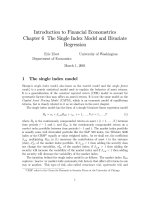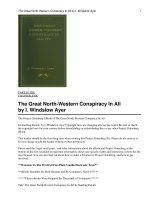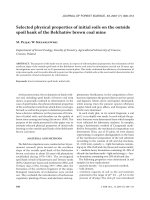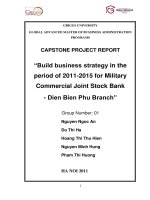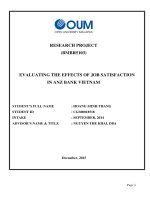Script should anz bank abandon the physical branch model and transition all its services online
Bạn đang xem bản rút gọn của tài liệu. Xem và tải ngay bản đầy đủ của tài liệu tại đây (714.91 KB, 15 trang )
TABLE OF CONTENTS
TABLE OF CONTENTS..........................................................................................i
INTRODUCTION.....................................................................................................1
DISCUSSION............................................................................................................2
Should ANZ bank abandon the physical branch model and transition all its
services online
i
INTRODUCTION
This report provides a detailed analysis of whether ANZ bank should
abandon the physical branch model and transition all its baking services to an online
model. To evaluate the question, factors such as the PEST analysis, SWOT analysis,
and Porter's five forces were conducted to assess the best decision for ANZ. After
extensive research, it is concluded that ANZ should not fully transition into an
online model but also maintain a physical branch for banking activities.
1
P
I. PEST ANALYSIS AND MODEL
1. Political stability in the existing markets – ANZ Banking Group operates in
several countries, so policies must be developed following the industry-specific
requirements of Regional Banks.
2. Regulatory Practices – ANZ Banking Group must manage various regulations in
various markets. In recent years, Australia and other emerging economies have
changed market entry rules and how companies in Regional Banks can operate in
the local market. (Barber, 2022)
3. Taxation policies – ANZ Banking Group has benefited from lower taxation
policies throughout the Western Hemisphere over the last two decades. It has
resulted in increased profits and spending on research and development (Dondoni,
2020).
4. Armed Conflict – There are no imminent threats to Australia from business
disruption caused by military policies, terrorist threats, or other political instability.
E
1. Inflation rate – Reserve Bank of Australia (RBA) on October 4 officially raised
the introductory interest rate by 0.25%, touching the threshold of 2.6%, leading to
Australia's inflation rate in the second quarter of 2022 at 6.1. % is forecast to peak
at 7.8% by the end of the fourth quarter (Sharp, 2022).
2. The efficiency of Australian financial markets - ANZ Banking Group can obtain
vibrant financial markets and easy liquidity in Australia's equity market to expand
worldwide.
3. Exchange rate – Australia's volatile AUD exchange rate can impact ANZ
Banking Group's investment plans and lead to some currency issues.
4. Downward pressure on consumer spending - Even though household disposable
income increased by 5% between 2010 and 2020, thanks to temporary government
income support, growing societal inequality will harm consumer sentiment and,
thus, consumer spending (Sharp, 2022).
S
1. Media outlets – ANZ Banking Group can leverage the trend of both traditional
media and social media to market better and position its products.
2. Gender roles - Because the average wage disparity between men and women in
Australia was 14% in 2019, ANZ Banking Group can test various concepts to cater
to and support these evolving gender roles in Australian society (Foster, 2022).
3. Power structure - Income inequality has risen sharply in most advanced
economies worldwide since the 1970s and has been blamed for Australia's
persistent power structure.
2
4. Migration - 53% of white Australians have a negative attitude toward
immigrants, making it difficult for ANZ Banking Group to gather international
leaders and managers to manage operations (Cobbett, 2022).
T
1. Lowering production costs -ANZ Banking Group must restructure its supply
chain to increase flexibility to meet customers' needs and cost structures in the
financial sector.
2. Technological innovation – The digital transformation of the supply chain began
in 2010, but COVID-19 has accelerated it, requiring ANZ to provide greater access
to information to supply chain partners and broader players in the financial industry
(Wallaker, 2022).
3. Mobile development and dissemination - To stay ahead of the competition, ANZ
Banking Group must meet and manage financial expectations and innovate.
4. The first mover in introducing innovations – ANZ was the first bank in Australia
to launch an app that allows small businesses to manage their cash flow by securely
processing same-day settlement of credit and debit card payments using an iPhone
or iPad.
3
4
5
S
II. SWOT ANALYSIS AND MODEL
1. High margins – While Australia's so-called Big Four banks have been
experiencing shrinking profit margins due to record-low interest rates, ANZ is still
racking in higher profit margins than competitors (Mallin, 2022).
2. Wide-ranging presence – ANZ Banking Group has an extensive dealer and
associate network, which assists in providing efficient services to customers and
managing competitive challenges in the Regional Banks industry.
3. Social acceptance – ANZ also has a dominant digital marketing strategy on
various social media platforms, which helps build a close relationship with
customers.
4. Diverse available services – ANZ has a diverse product portfolio that reduces the
risks associated with ANZ bank operations and is suitable for online launch.
W
1. Declining market share – Due to the company's slower revenue growth, ANZ
Banking Group must carefully analyze the various trends within the Financial sector
and determine what it needs to do to drive future growth.
2. Inadequate investments in customer-oriented services – This may result in
competitors gaining an advantage shortly.
3. Slow decision–making process, resulting in a more extended transition to an
online model.
4. Reluctant to transition – Although ANZ's 'Career Extension' options allow older
workers to keep working, they are hesitant to switch to an online model after
following traditional banking methods.
O
1. Significant technological investment – Technological advancement forces ANZ
to adapt and improve its efficiency and effectiveness in conducting business.
2. Opportunities in the Online Space – As customers adopt more online services,
ANZ Banking Group can provide new offerings to customers in the Regional
Financial industry.
3. Increase customer base – Moving to an online model will lead to capturing more
customers (Mark et al. 2013).
4. Financial market expansion – The ability to expand the financial market to
remote locations via online databases.
T
1. Skilled staff shortage – The company may face trained human resource
challenges soon due to high employee turnover and an increasing reliance on
innovative solutions.
6
2. Competitors' product development – Due to technological advancements, there is
fierce competition among the top four banks in online banking (Mallin, 2022).
3. High risk of data breaches – High level of cyber threats, potentially resulting in
the loss of personal customer data
4. Legal issues – Increased rate of illegal monetary activities as a result of
widespread coverage
7
8
Rivalry<high>
III. PORTER'S FIVE FORCES
ANZ faces stiff competition from a plethora of rivals.
Profitability in the banking industry is low as firms compete with aggressive
targeting and pricing strategies (Said & Doll, 2021).
Buyer power<High>
Buyers' bargaining power against ANZ grows as their customer base
becomes more concentrated.
Customers' loyalty is low as a result of the competitive environment.
Customers expect high-quality goods and services for a low price.
Solution
1. Building loyalty by incorporating innovation and providing an exceptional
customer experience can increase switching costs.
2. ANZ should produce new niche markets to provide customers with
customized products and services.
Substitutes<low>
1. Product and service differentiation is relatively low among banking
organizations.
2. Other banks' substitute products and services are widely available.
3. Customers cannot obtain the same utility from a substitute product in
terms of functionality and quality that they do from ANZ's product.
Solution
1. ANZ should clearly state how its offered goods and services are superior
to the alternatives.
2. They should also improve the quality, maximize the value for money, and
establish a strong differentiation basis to discourage customers from using a
substitute product.
Entrants<low>
1. The regulatory framework challenges new firms seeking to enter the financial
market.
2. Entry into the industry necessitates a large initial capital investment and
significant resource investment.
3. Existing market players are fiercely competitive.
Solution
9
1. To access the target market, ANZ should establish long-term contractual
relationships with distributors.
2. Focusing on customer relationship management can foster brand loyalty.
Supplier power<low>
1. Switching from one supplier to another is inexpensive for buyers.
2. There is no threat of forwarding supplier integration.
3. Suppliers are not geographically concentrated, and their concentration is lower
than that of buyers.
Solution
1. ANZ can strengthen its position against suppliers by reducing its reliance on a
single or a few suppliers.
2. The bank should investigate alternative production methods if the product
demand is high enough and the firm has the necessary competencies and expertise.
10
11
12
IV. RECOMMENDATION
According to the findings of the given analyses, ANZ Bank should not abandon
the physical branch model and proceed with all of its services online.
Through the PEST analysis, the high inflation rate and fluctuations in the
exchange rate between AUD and USD will stymie digital transformations.
Despite ANZ's extensive dealer network, the SWOT analysis highlights that the
workers' reluctance to transition to an online model could lead to an employment
shortage.
The critical point of Porter's five forces was maximizing value for money and
establishing a solid differentiation basis to foster brand loyalty.
13
REFERENCES
Barber, W 2022, The Evolving Australian Labour Market | Speeches, viewed
5 October, 2022, < />Cobbett, B 2022, Migration, Australia, 2019-20 financial year, viewed 7
October, 2022, < />Dondoni, A 2020, "Selected Research Topics of the Dondoni Group over the
Last Two Decades (2000–2020)", Synlett, vol. 31, no. 14, pp. 1361-1371.
Foster, L 2022, Australia's gender pay gap still 14%, with men earning $240
more
a
week
than
women,
viewed
7
October,
2022,
< />Mallin, I 2022, Does ANZ really have the best profit margins of the big four
bank shares?, viewed 8 October, 2022, < />Mark, T, Lemon, K, Vandenbosch, M, Bulla, J & Maruotti, A 2013,
"Capturing the Evolution of Customer–Firm Relationships: How Customers
Become More (or Less) Valuable Over Time", Journal of Retailing, vol. 89, no. 3,
pp. 231-245.
Said, K & Doll, Y 2021, "Strategies to Improve Financial Profitability in the
Banking Industry", International Journal of Applied Management and Technology,
vol. 20, no. 1.
Sharp, S 2022, Financial Stability Review – October 2022, viewed 6
October, 2022, < />Wallaker, G 2022, Digital Transformation of the Supply Chain: Now and
Next, viewed 7 October, 2022, < />
14
